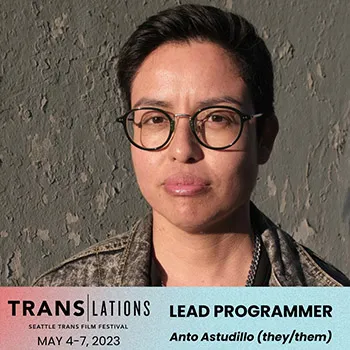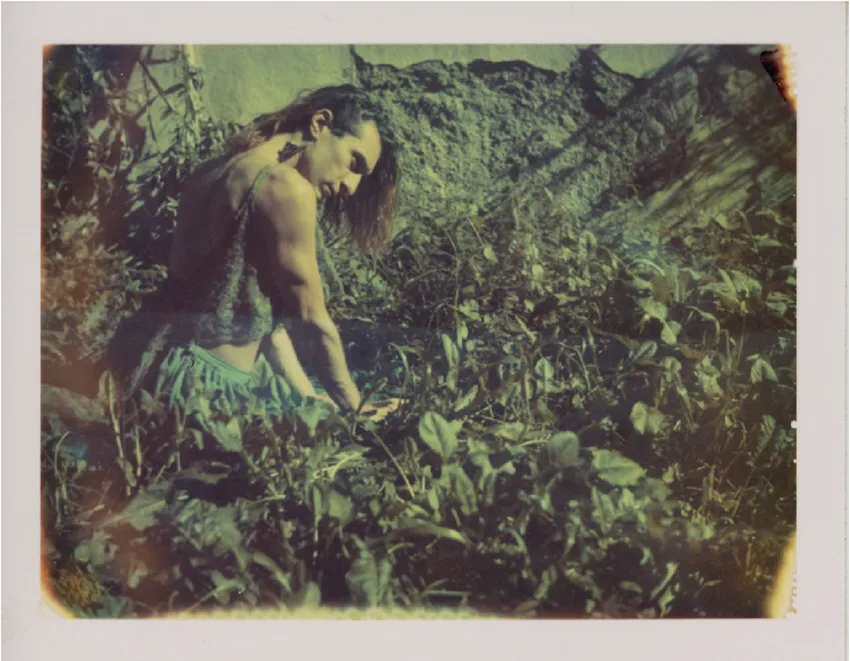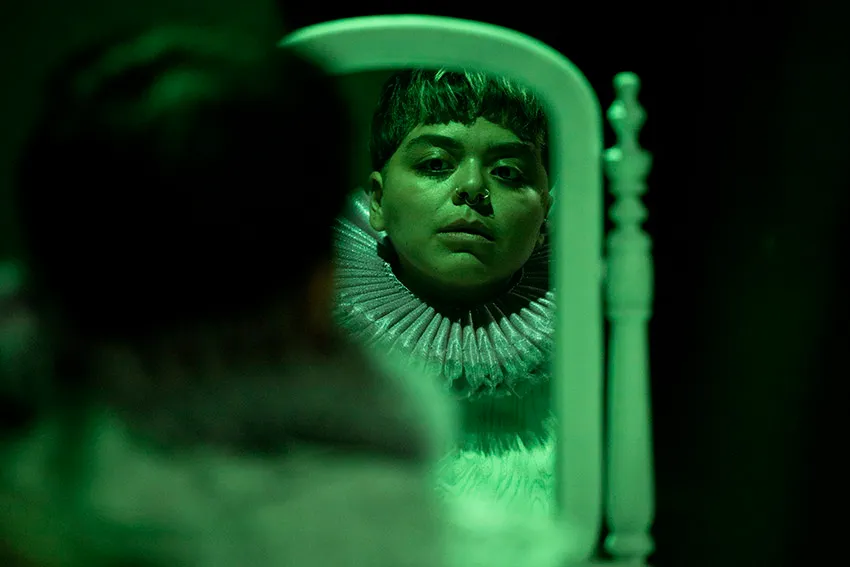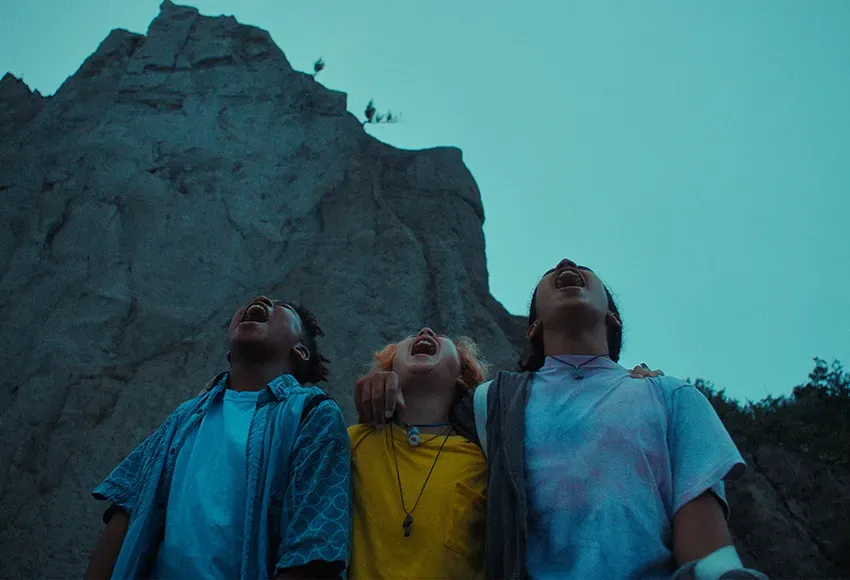Building community through cinema with lead programmer Anto Astudillo
The 18th annual TRANSlations Film Festival officially kicked of with the opening of its online portal, but the big events take place this evening at Columbia City's Ark Lodge Cinemas, starting with the presentation of the inaugural TRANSlations Trailblazer Award to Lingua Franca director Isabel Sandoval. It will be immediately followed by the opening night film, writer-director Luis De Filippis' Something You Said Last Night.
The majority of this year's in-person screenings and activities are split between the Ark Lodge and the Beacon Cinema, all culminating with the special closing night presentation "Trans Through Time" on May 6, a shorts and archival program crafted with the assistance of the UCLA/OUTFEST Legacy Project. The virtual portion of the festival closes a day later.
I touched base with the lead programmer, filmmaker Anto Astudillo, to chat about this year's TRANSlations festival. The following are some of the edited highlights from our free-flowing, far-too-brief conversation:

Sara Michelle Fetters: The TRANSlations Film Festival has been a big part of the Seattle film community for a long time, which is great. It's so wonderful to see it succeed and continue to thrive. However, in some ways, 2023 feels like the most important TRANSlations Film Festival that we've had. Would you agree with that?
Anto Astudillo: Yes. I think it's urgent. But I think the festival has been essential every year. I remember the words of Storm Miguel last year: "Trans films are essential."
And it's true. I share that opinion. I think this year it becomes more urgent, because of everything that's happening in the country and with all these anti-Trans bills appearing in so many states around the country.
This inspired the theme for this year's festival. "Trans Through Time" comes from me thinking about letting people know that we've been here for a long time and that Trans stories have been here for a long time. That this is nothing new.
We're doing a lot of things that have to do with honoring our past in order to celebrate our present and imagine our future. One of those things is the TRANSlations Trailblazer Award, which is going to Isabel Sandoval. The festival showed her film Lingua Franca back in 2020 online and, for the first time, we're showing it in person this year. We're really happy about that. We're showing it with Shangri-La, a short film that she did recently for Prada/Miu Miu. Giving this award to her has a lot of meaning for Trans filmmakers like me who have followed Isabel's work for many years and who see her as a mentor. I look up to her in many ways, and I know a lot of filmmakers do as well.
...Hopefully we'll be giving this award every year to honor a Trans filmmaker with a history. ... This is a history that Trans folks need nowadays. ...That's our history. We need to look back and be able to find our own history and be proud to share it with others.

There are other films in the festival program that ...deal with that history as well. ...Summer Within dives into the history of Trans lives in Italy, and Uncovered Girl looks into the history of Trans lives in Peru. My grandma's family is from Peru, and I am from Chile, so I was really excited to find this piece of history and to be able to share it with others. It's a history that's so close to me.
SMF: The venues for the TRANSlations Film Festival have mostly been on Capitol Hill, but this time we're at the Ark Lodge for the majority of the festival. You're also at the Beacon Cinema. What was that move like, and how have the Ark Lodge and the Beacon embraced the festival?
AA: [Having been] a guest curator in different film festivals, I've had the chance to go to festivals that are in specific towns. When the time of the festival comes, it brings so many films and filmmakers to that town. I thought, what a great opportunity to do that in Seattle, to have TRANSlations in Columbia City for the first time. Maybe [it will be] the first of many years where we will come to this neighborhood and make the festival a staple there. We would love for that to happen.
I think that Ark Lodge and the Beacon Cinema know this is something that can happen. They were both open and excited to have us this year. We are thankful to be able to be in these two theaters showing different programs.
I wish we had more days, to be honest, because I wanted to show all the films in person. Some of the films unfortunately, are only going to be online. But I would love in the future for TRANSlations to have more days and be a part of the neighborhood, become a festival that happens there every year. Something the local community can become excited about and proud of.
SMF: What is it like for you as a Trans filmmaker and as a programmer, in that you have these amazing positives of being able to do this event in such a supportive environment, but at the same time having to juxtapose that with everything else that's happening in our society right now?
AA: It's really difficult. I will start saying that because as I am working through the program as a lead programmer this year and connecting with people in the community – ...the screening committee, which is a huge part of the festival, and everyone working on the festival, and all the filmmakers that I'm talking to every day – we're all very aware of what is happening. I think it's very difficult to wake up in the morning and see that kind of news pop up in your social media.
But I think that what drives me personally is the fact that people will not stop. And by people, I mean our community. We will not stop making the art, making the work. And we need to show each other's work. We need to show that there are places that celebrate this work and that are uplifting these voices.
I believe in festivals like TRANSlations. I go back to this idea of it being essential. Having a festival where we can come together is essential. So, yes, it is really difficult for me, but it is also inspiring to be a part of a film festival that's a Trans film festival like TRANSlations. It's the reason why I joined. It's the reason why I'm here and that I work tirelessly every day.
SMF: Because of the pandemic, it has not necessarily been possible the last couple years to have as many events, panels, and forums as TRANSlations has previously offered. It seems like, this year, you and your team have prioritized bringing back panels, discussions, and forums, and they are a mixture of in-person and virtual. Was it important to you to not just have the films but to have these moments where people can get together for discussion, education, community, and debate?
AA: Absolutely. As I said, I'm a filmmaker, but I'm also part of a very active community of independent filmmakers. I was very active when I was in Boston. I was a professor and taught for many years at Emerson and the [Massachusetts College of Art and Design] film schools. When I moved to New York, I also became an active member of the independent film community.
I'm very used to not just making film or showing film programming work but also having these conversations that are extremely important, in order to understand that work and mostly to create community. For me, the key to everything is to create community. This is how we're going to be able to create a better society. I'm a true believer in community.
When I started working at the festival, I wanted to have panels or conversations. Some of them I call "community panels" or "community conversations," where I want people to be a part of that conversation. One of those panels is with Daniel Sea. You might know Daniel from The L Word and also from the West Coast punk scene. They were part of the punk scene from the San Francisco Bay Area, and they are currently doing performance art and becoming really active in the community.
I wanted to invite Daniel, and when we were in conversation, as a guest artist, Daniel proposed having a conversation with the community about everything that's happening in the US right now. Bringing up these important topics that we need to talk about and come together as a community because, maybe out of those conversations, you find real ways in which you can support each other.
For me, since we were going to do a hybrid festival with some portion of it online, some portion of it in person, I thought it was important to bring folks together at these community panels.
SMF: It goes without saying that the TRANSlations Film Festival is exceedingly popular and singularly important to the Transgender community here in the Pacific Northwest and specifically Seattle. At the same time, this festival reaches out to a broader audience than just the Transgender community. How important is it, do you think, especially right now, for everyone to be seeing these films? To be part of this conversation?
AA: Extremely important. I'm going to give you an example. As a filmmaker, I've shown my work in film festivals that are Queer/Trans-focused festivals. But I've also shown my work in festivals that are not....
Recently I showed ...one of my films at the Ann Arbor Film Festival, and showing this work to people who are not a part of the community or the Trans/Queer community, it's an eye-opener. It opens eyes to something that [the audience] were not thinking about. It can be scary. I was scared to show this work and ...especially with everything that's happening, not knowing who was going to be in the audience.
After showing the work, getting the questions ...and the reception that I got right after the screening, talking to the community, people from the audience and from the film community, I was so excited that they resonated with what I was saying with my own, personal experience. Folks that are not part of the community resonated with the piece. They can take that experience of watching films like this and share it with others, and I think that is what is going to start happening with TRANSlations. I truly see that the festival is going to continue to grow.
This year, I wanted to reach out to a lot of people that I know from other countries, international artists, because I truly think that this festival has the potential to travel around the world and to become a reference for people who want to find the work of Trans, Nonbinary, gender-nonconforming, and Two Spirit artists. That's what I'm looking for, and that's what I hope for the festival.
That's why I think it's important to share. The more people that can see this work, the more that there is a conversation. I am so excited for people to see all these films. Every film is so different, and even though most of the films, if not all..., talk about the Trans experience in some capacity, every one speaks in such a different way. They show how complex our lives are, and I think that's something that people who are outside of the community don't even think about.

SMF: What do you hope audiences take away from this year's festival? What do you want them to be talking about after the dust has settled and TRANSlations has come to an end?
AA: That's a very complex question. First of all, I think people, our core audience, which is our community, they are going to watch these films and I believe that they are going to become energized. There's so much strength that I think that emanates and comes from watching these films, as someone who is Trans or identifies as Trans. I think that it is empowering for our community to watch this work, and I think that it will inspire folks to make films, even if they have never done it before. I think that some of these films are going to become a reference for our community.
I hope people start talking about the history of Trans cinema as well. There is this film program called "Trans Through Time." It's ...a closing night program, and I truly want people to watch it and see throughout history how the ways we talk about our experiences have changed. How our perspectives have changed through time and where we are right now. It's kind of like a ripple effect. I would love for audiences to realize how powerful these stories are and how beautiful our lives are as well.


